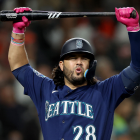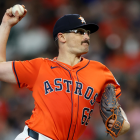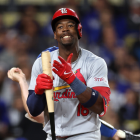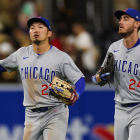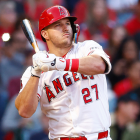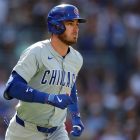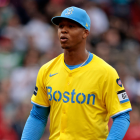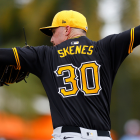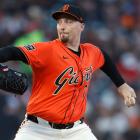LOS ANGELES -- Game 3 of the 2018 World Series between the Red Sox and Dodgers sprawled into the 18th inning and for more than seven hours before Max Muncy's walk-off home run cut Boston's series lead to 2-1.
The twists and turns of this opera of a game will be remembered for a long time, but what matters in the here and now is how this game, began in the autumn L.A. sunshine and ended around half past midnight, will ripple through the remainder of the series no matter how the remainder plays out. Here's what we mean when we say that:
It's a series again
In all but the most literal of senses, this was a must-win for the Dodgers. Famously, only one team in MLB -- the 2004 Red Sox in the ALCS -- has come back from down 3-0 to win a best-of-seven postseason series. The other 36 teams have lost. So in essence the Dodgers would have had almost no chance of coming back in this World Series if, say, Boston's 2-1 lead in the 13th had held. Things as they are, though, the Dodgers are down 2-1 and would play a potential Game 6 and 7 on the road. Teams in such circumstances have come back to win the series in question roughly one-quarter of the time. Those aren't great odds, but they're certainly better than 1 in 37. As well, the early SportsLine projection for Game 4 sees the Dodgers as slight favorites. They're still underdogs, but that deep-in-the-night win in Game 3 gives them something they wouldn't have had if they'd lost -- a real chance.
So who wins every playoff game? And which teams are a must-back? Visit SportsLine now to get MLB Playoff picks from the proven model that simulates every game 10,000 times, and find out.
It's Pomeranz or bust for Boston in Game 4
Ideally, Alex Cora would've been able to start Nathan Eovaldi in Game 4 after he made relief appearances in Games 1 and 2. Instead, Eovaldi wound up authoring a borderline heroic relief outing in Game 3 -- one that saw him allow two runs (one earned) in six innings of work. Along the way, he threw 97 pitches (!). In comparison, Boston starter Rick Porcello threw 61 on the night. Eovaldi is likely on ice until the series shifts back to Boston.
By the time Game 3 ended on the Muncy walk-off homer, Drew Pomeranz and a short-rest Chris Sale were the last two pitchers left in Cora's bullpen. Given Sale's struggles with command, velocity and health since the stretch drive, starting him on short rest in Game 4 seems out of the question. So by dint of being the last man standing, it's Pomeranz. The left-hander during the regular season pitched to a 6.08 ERA and 1.50 K/BB ratio in 74 innings. Most of that not-at-all-good work came out of the bullpen. Pomeranz hasn't made a start since Aug. 7. He hasn't lasted at least six innings since May 8.
The Boston bullpen is, yes, tired
The assumption, then, is that Pomeranz isn't going to go deep into Game 5. If there's any heavy-lifting to be done, then perhaps it's Eduardo Rodriguez. He's pretty much been used as a LOOGY in the World Series -- one batter faced in each of his two relief appearances against the Dodgers. Rodriguez also made 23 starts during the regular season, so he's stretched out in that sense. As well, he's rested relative to the remainder of the non-Pomeranz arms on the Boston staff.
Elsewhere, Joe Kelly and Craig Kimbrel join Eovaldi in having pitched in every game of the series thus far. Kimbrel in Game 3 went 1 1/3 innings and threw 28 pitches. In the ALCS, he pitched and pitched effectively the day after logging 35 pitches, so there's precedent insofar as Game 4 is concerned. That, however, would mean four appearances in five days for Kimbrel. He'll answer the bell if summoned, of course, but we'll see if mounting fatigue is an issue. As for Kelly, he needed just 12 pitches to work his inning in Game 3, and he worked single innings in Games 1 and 2, as well. He figures to be available. Heath Hembree threw 25 pitches, but he hadn't pitched since Game 1 of the ALCS. Ryan Brasier and Matt Barnes appeared in Game 3, but neither pitched in Game 2.
Really, thanks to Eovaldi and his sherpa's load in Game 3, the Boston bullpen isn't as run down as you might think if you eyeballed the line score that stretched to the 18th. If Pomeranz gets knocked out early, though, they could be in a pickle, especially since presumed long-man Rodriguez is, like Pomeranz, also lefty and would likewise be up against all those Dodger platoon bats. A disaster start by Pomeranz -- certainly within the range of possibilities -- not only very likely costs the Red Sox Game 4 but seriously compromises their bullpen for Game 5 the very next evening. That's when you might see the blow-back from Game 3 hit Boston.
The Dodgers are in a better spot on the pitching front
Walker Buehler's seven innings not only put the Dodgers in a position to win, but they also lessened the eventual load on the rest of the staff-mates. As for specifics, Boston relievers in Game 3 wound up throwing 222 pitches, while Dodger relievers logged 170. In large measure, that traces back to Buehler's throwback effort. As for Game 4, Rich Hill gets the start, and that's as planned. Straightaway, you see the Dodgers' rotation plans were not waylaid by Game 3 as the Red Sox's were.
Elsewhere, Pedro Baez, who's emerged as Dave Roberts' setup man of first resort, may be a stretch. He threw 26 pitches in Game 3 and has now appeared in every game of the series. Yes, closer Kenley Jansen blew the save in Game 3 and wound up throwing 32 pitches. However, he didn't appear in Game 1 or Game 2. In the NLCS against the Brewers, Jansen pitched the day after registering 34 pitches, so he's done it before. He figures to be available. Ryan Madson faced only one batter in Game 3. Kenta Maeda and Alex Wood had modest loads relative to what they've handled in the past.
Really, this sums it up: In Game 3, the Dodgers used one member of their ideal-world postseason rotation, while the Red Sox used three (don't forget about David Price's appearance).
The hitters are tired
If you sat through all those extra innings on Friday/Saturday, then you saw a lot of hitters struggling to catch up to velocity and drive the ball. Every player is tired by late October, but when you take, oh, 40 game swings under World Series pressure, as some hitters did in Game 3, the fatigue compounds. Let's see if this yields lower-scoring games the rest of the way -- like, say, Game 3, which gave us five total runs.
And with that -- all of that -- the 2018 World Series has seen its first reset. Let's see how far the tentacles of Game 3 reach.














